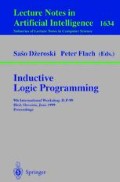Abstract
Numerous measures are used for performance evaluation in machine learning. In predictive knowledge discovery, the most frequently used measure is classification accuracy. With new tasks being addressed in knowledge discovery, new measures appear. In descriptive knowledge discovery, where induced rules are not primarily intended for classification, new measures used are novelty in clausal and subgroup discovery, and support and confidence in association rule learning. Additional measures are needed as many descriptive knowledge discovery tasks involve the induction of a large set of redundant rules and the problem is the ranking and filtering of the induced rule set. In this paper we develop a unifying view on some of the existing measures for predictive and descriptive induction. We provide a common terminology and notation by means of contingency tables. We demonstrate how to trade off these measures, by using what we call weighted relative accuracy. The paper furthermore demonstrates that many rule evaluation measures developed for predictive knowledge discovery can be adapted to descriptive knowledge discovery tasks.
Access this chapter
Tax calculation will be finalised at checkout
Purchases are for personal use only
Preview
Unable to display preview. Download preview PDF.
References
P. Clark and T. Niblett (1989). The CN2 induction algorithm. Machine Learning 3, pp. 261–284.
L. Dehaspe and L. De Raedt (1997). Mining association rules with multiple relations. In N. Lavrac and S. Džeroski (Eds.), Proc. 7th Int. Workshop on Inductive Logic Programming (ILP’97), pp. 125–132, LNAI 1297, Springer-Verlag.
P.A. Flach and N. Lachiche (1999). A first-order approach to unsupervised learning. Submitted.
P.A. Flach and I. Savnik (1999). Database dependency discovery: a machine learning approach. AI Communications, to appear.
W. Klösgen (1996). Explora: A multipattern and multistrategy discovery assistant. In U.M. Fayyad, G. Piatetsky-Shapiro, P. Smyth and R. Uthurusamy (Eds.), Advances in Knowledge Discovery and Data Mining, 249–271, AAAI Press.
T. Mitchell (1997). Machine Learning, McGraw Hill.
P.M. Murphy and D.W. Aha (1994). UCI Repository of machine learning databases [http://www.ics.uci.edu/~mlearn/mlrepository.html]. Irvine, CA: University of California, Department of Information and Computer Science.
S. Wrobel (1997). An algorithm for multi-relational discovery of subgroups. In J. Komorowski and J. Zytkow (Eds.), Proc. First European Symposium on Principles of Data Mining and Knowledge Discovery PKDD’97, Springer-Verlag.
G. Piatetsky-Shapiro (1991). Discovery, analysis and presentation of strong rules. In G. Piatetsky-Shapiro and W. Frawley (Eds.), Knowledge Discovery in Databases, 229–249. AAAI Press.
Author information
Authors and Affiliations
Editor information
Editors and Affiliations
Rights and permissions
Copyright information
© 1999 Springer-Verlag Berlin Heidelberg
About this paper
Cite this paper
Lavrač, N., Flach, P., Zupan, B. (1999). Rule Evaluation Measures: A Unifying View. In: Džeroski, S., Flach, P. (eds) Inductive Logic Programming. ILP 1999. Lecture Notes in Computer Science(), vol 1634. Springer, Berlin, Heidelberg. https://doi.org/10.1007/3-540-48751-4_17
Download citation
DOI: https://doi.org/10.1007/3-540-48751-4_17
Published:
Publisher Name: Springer, Berlin, Heidelberg
Print ISBN: 978-3-540-66109-2
Online ISBN: 978-3-540-48751-7
eBook Packages: Springer Book Archive

